高中英语虚拟语气讲解与练习
高中英语 虚拟语气讲解及练习(有答案)
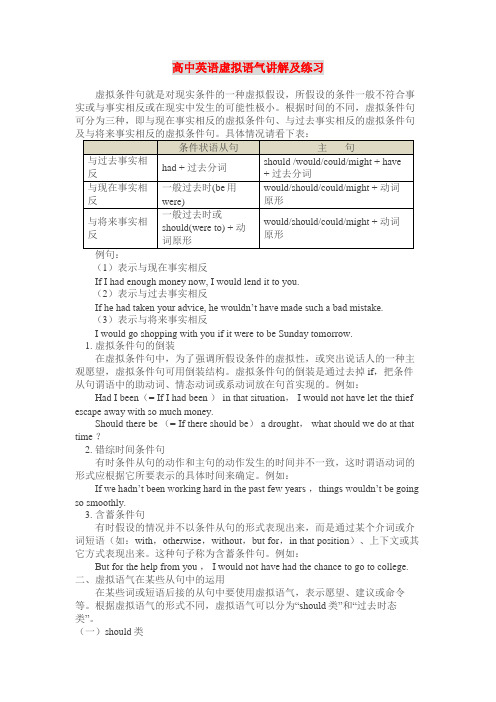
高中英语虚拟语气讲解及练习虚拟条件句就是对现实条件的一种虚拟假设,所假设的条件一般不符合事实或与事实相反或在现实中发生的可能性极小。
根据时间的不同,虚拟条件句可分为三种,即与现在事实相反的虚拟条件句、与过去事实相反的虚拟条件句(1)表示与现在事实相反If I had enough money now, I would lend it to you.(2)表示与过去事实相反If he had taken your advice, he wouldn’t have made such a bad mistake.(3)表示与将来事实相反I would go shopping with you if it were to be Sunday tomorrow.1. 虚拟条件句的倒装在虚拟条件句中,为了强调所假设条件的虚拟性,或突出说话人的一种主观愿望,虚拟条件句可用倒装结构。
虚拟条件句的倒装是通过去掉if,把条件从句谓语中的助动词、情态动词或系动词放在句首实现的。
例如:Had I been(= If I had been ) in that situation, I would not have let the thief escape away with so much money.Should there be (= If there should be) a drought, what should we do at that time ?2. 错综时间条件句有时条件从句的动作和主句的动作发生的时间并不一致,这时谓语动词的形式应根据它所要表示的具体时间来确定。
例如:If we hadn’t been working hard in the past few years ,thing s wouldn’t be going so smoothly.3. 含蓄条件句有时假设的情况并不以条件从句的形式表现出来,而是通过某个介词或介词短语(如:with,otherwise,without,but for,in that position)、上下文或其它方式表现出来。
高中英语虚拟语气讲解及练习附答案

高中英语虚拟语气讲解及练习虚拟条件句就是对现实条件的一种虚拟假设,所假设的条件一般不符合事实或与事实相反或在现实中发生的可能性极小。
根据时间的不同,虚拟条件句可分为三种,即与现在事实相反的虚拟条件句、与过去事实相反的虚拟条件句(1)表示与现在事实相反If I had enough money now, I would lend it to you.(2)表示与过去事实相反If he had taken your advice, he wouldn’t have made such a bad mistake.(3)表示与将来事实相反I would go shopping with you if it were to be Sunday tomorrow.1. 虚拟条件句的倒装在虚拟条件句中,为了强调所假设条件的虚拟性,或突出说话人的一种主观愿望,虚拟条件句可用倒装结构。
虚拟条件句的倒装是通过去掉if,把条件从句谓语中的助动词、情态动词或系动词放在句首实现的。
例如:Had I been(= If I had been ) in that situation, I would not have let the thief escape away with so much money.Should there be (= If there should be) a drought, what should we do at that time ?2. 错综时间条件句有时条件从句的动作和主句的动作发生的时间并不一致,这时谓语动词的形式应根据它所要表示的具体时间来确定。
例如:If we hadn’t been working hard in the past few years ,thing s wouldn’t be going so smoothly.3. 含蓄条件句有时假设的情况并不以条件从句的形式表现出来,而是通过某个介词或介词短语(如:with,otherwise,without,but for,in that position)、上下文或其它方式表现出来。
高中英语虚拟语气讲解及练习题(附答案)

高中英语虚拟语气讲解及练习虚拟条件句就是对现实条件的一种虚拟假设,所假设的条件一般不符合事实或与事实相反或在现实中发生的可能性极小。
根据时间的不同,虚拟条件句可分为三种,即与现在事实相反的虚拟条件句、与过去事实相反的虚拟条件句(1)表示与现在事实相反If I had enough money now, I would lend it to you.(2)表示与过去事实相反If he had taken your advice, he wouldn’t have made such a bad mistake.(3)表示与将来事实相反I would go shopping with you if it were to be Sunday tomorrow.1. 虚拟条件句的倒装在虚拟条件句中,为了强调所假设条件的虚拟性,或突出说话人的一种主观愿望,虚拟条件句可用倒装结构。
虚拟条件句的倒装是通过去掉if,把条件从句谓语中的助动词、情态动词或系动词放在句首实现的。
例如:Had I been(= If I had been ) in that situation, I would not have let the thief escape away with so much money.Should there be (= If there should be) a drought, what should we do at that time ?2. 错综时间条件句有时条件从句的动作和主句的动作发生的时间并不一致,这时谓语动词的形式应根据它所要表示的具体时间来确定。
例如:If we hadn’t been working hard in the past few years ,thing s wouldn’t be going so smoothly.3. 含蓄条件句有时假设的情况并不以条件从句的形式表现出来,而是通过某个介词或介词短语(如:with,otherwise,without,but for,in that position)、上下文或其它方式表现出来。
高中虚拟语气的讲解+练习+详解

高中英语虚拟语气讲解及练习虚拟条件句就是对现实条件的一种虚拟假设,所假设的条件一般不符合事实或与事实相反或在现实中发生的可能性极小。
根据时间的不同,虚拟条件句可分为三种,即与现在事实相反的虚拟条件句、与过去事实相反的虚拟条件句(1)表示与现在事实相反If I had enough money now, I would lend it to you.(2)表示与过去事实相反If he had taken your advice, he wouldn’t have made such a bad mistake.(3)表示与将来事实相反I would go shopping with you if it were to be Sunday tomorrow.1. 虚拟条件句的倒装在虚拟条件句中,为了强调所假设条件的虚拟性,或突出说话人的一种主观愿望,虚拟条件句可用倒装结构。
虚拟条件句的倒装是通过去掉if,把条件从句谓语中的助动词、情态动词或系动词放在句首实现的。
例如:Had I been(= If I had been ) in that situation, I would not have let the thief escape away with so much money.Should there be (= If there should be) a drought, what should we do at that time ?2. 错综时间条件句有时条件从句的动作和主句的动作发生的时间并不一致,这时谓语动词的形式应根据它所要表示的具体时间来确定。
例如:If we hadn’t been working hard in the past few years ,thing s wouldn’t be going so smoothly.3. 含蓄条件句有时假设的情况并不以条件从句的形式表现出来,而是通过某个介词或介词短语(如:with,otherwise,without,but for,in that position)、上下文或其它方式表现出来。
高中英语虚拟语气讲解及练习

虚拟语气-高中英语语法精讲精练虚拟语气表示说话人的主观愿望、猜测建议或与事实不符的假设。
虚拟语气可分为三种:(1一般虚拟(2混合虚拟(3特殊句式一.一般虚拟的构成:(省略if, 要将should/were/had 提到句首(1. 对现在的虚拟:If S. did/were sth., S. would/could/should doIf I had time, I would attend the meeting.If I were you, I would seize the chance to go abroad.(2 对过去的虚拟:If S. had p.p, S. would/could/should have p.pIf you had taken my advice, you would not have failed in the exam.(3 对将来的虚拟:If S. did/were/should do/were to do, S would/should/could do sth.If you came tomorrow, we would have the meeting.If it were to rain tomorrow, the sports meeting would be put off.If he should not come tomorrow, we should put off the meeting till next day.注意:Had we made good preparations, we might have succeeded.Had it not rained, we would have gone out for a walk.Were I you, I would not do such a thing.二.混合虚拟:(1不同时间的虚拟:If he had listened to me, he would not be in trouble now.If he had told me yesterday, I should know what to do now.(2 虚拟与陈述的混合:He could have passed the exam, but he wasnt careful enough.You should have come earlier, the bus left a moment ago.三.特殊句式:(1.suggest, advise, recommend, propose, order, command, request, require, demand that clause (should do/doHe suggested that we (should save money for the future.(insist的判断(2 It is suggested/advised/ordered/requested/required that clause(should do/do(主语从句(3 My advice/suggestion/request/requirement is that-clause (should do /do (表语从句His suggestion/advice/request/requirement that clause(should do/do is.. (同位语从句(4 It is natural/necessary/strange that-clause (should do/do表惊奇、怀疑、惋惜、不满、理应如此等。
高中英语虚拟语气讲解及练习题(附答案)

高中英语虚拟语气讲解及练习虚拟条件句就是对现实条件的一种虚拟假设,所假设的条件一般不符合事实或与事实相反或在现实中发生的可能性极小。
根据时间的不同,虚拟条件句可分为三种,即与现在事实相反的虚拟条件句、与过去事实相反的虚拟条件句(1)表示与现在事实相反If I had enough money now, I would lend it to you.(2)表示与过去事实相反If he had taken your advice, he wouldn’t have made such a bad mistake.(3)表示与将来事实相反I would go shopping with you if it were to be Sunday tomorrow.1. 虚拟条件句的倒装在虚拟条件句中,为了强调所假设条件的虚拟性,或突出说话人的一种主观愿望,虚拟条件句可用倒装结构。
虚拟条件句的倒装是通过去掉if,把条件从句谓语中的助动词、情态动词或系动词放在句首实现的。
例如:Had I been(= If I had been ) in that situation, I would not have let the thief escape away with so much money.Should there be (= If there should be) a drought, what should we do at that time ?2. 错综时间条件句有时条件从句的动作和主句的动作发生的时间并不一致,这时谓语动词的形式应根据它所要表示的具体时间来确定。
例如:If we hadn’t been working hard in the past few years ,thing s wouldn’t be going so smoothly.3. 含蓄条件句有时假设的情况并不以条件从句的形式表现出来,而是通过某个介词或介词短语(如:with,otherwise,without,but for,in that position)、上下文或其它方式表现出来。
高中英语 虚拟语气讲解及练习(有答案)

高中英语虚拟语气讲解及练习虚拟条件句就是对现实条件的一种虚拟假设,所假设的条件一般不符合事实或与事实相反或在现实中发生的可能性极小。
根据时间的不同,虚拟条件句可分为三种,即与现在事实相反的虚拟条件句、与过去事实相反的虚拟条件句(1)表示与现在事实相反If I had enough money now, I would lend it to you.(2)表示与过去事实相反If he had taken your advice, he wouldn’t have made such a bad mistake.(3)表示与将来事实相反I would go shopping with you if it were to be Sunday tomorrow.1. 虚拟条件句的倒装在虚拟条件句中,为了强调所假设条件的虚拟性,或突出说话人的一种主观愿望,虚拟条件句可用倒装结构。
虚拟条件句的倒装是通过去掉if,把条件从句谓语中的助动词、情态动词或系动词放在句首实现的。
例如:Had I been(= If I had been ) in that situation, I would not have let the thief escape away with so much money.Should there be (= If there should be) a drought, what should we do at that time ?2. 错综时间条件句有时条件从句的动作和主句的动作发生的时间并不一致,这时谓语动词的形式应根据它所要表示的具体时间来确定。
例如:If we hadn’t been working hard in the past few years ,thing s wouldn’t be going so smoothly.3. 含蓄条件句有时假设的情况并不以条件从句的形式表现出来,而是通过某个介词或介词短语(如:with,otherwise,without,but for,in that position)、上下文或其它方式表现出来。
高中英语虚拟语气知识点详解及练习(含答案)

虚拟语气详讲及练习一、定义:虚拟语气表示动作或状态与事实相反,或不可能发生的情况。
1.虚拟语气用于条件状语从句中1)表示与现在事实相反或不可能发生:一般过去时(虚拟语气中be→were)Eg. If he had time, he would (could, might) go with youEg.If I were you, I would work hard.2)表示与过去事实相反或不可能发生Eg.If he had taken my advice,he would have succeeded in passing the examination.Eg.If they had helped us, we would have finished the task. (实际上没帮)3)表示与将来的事实可能相反或不可能发生Eg.If it should rain, the crops would be saved.Eg.If it were to snow tomorrow, they would not go out.4)※注意:虚拟语气的倒装语序:如果if从句里含有should, had, were或其他助动词,则可将从属连词if省去,将助动词.情态动词.be或have放在句首形成部分倒装.Eg.If he had finished the work yesterday, he would have gone to the concert with you.=Had he finished the work yesterday, he would have gone to the concert with you.Eg.If I were you, I would go to the party.=Were I you, I would go to the party.Eg.If it should rain tomorrow, I would stay at home=Should it rain tomorrow, I would stay at home.2. 虚拟语气在宾语从句中的用法➢在动词wish后的宾语从句中,表示与现在或过去的事实相反,或对将来的主观愿望,从句通常省略连词that。
高中英语虚拟语气讲解及练习附答案解析

高中英语虚拟语气讲解及练习虚拟条件句就是对现实条件的一种虚拟假设,所假设的条件一般不符合事实或与事实相反或在现实中发生的可能性极小。
根据时间的不同,虚拟条件句可分为三种,即与现在事实相反的虚拟条件句、与过去事实相反的虚拟条件句(1)表示与现在事实相反If I had enough money now, I would lend it to you.(2)表示与过去事实相反If he had taken your advice, he wouldn’t have made such a bad mistake.(3)表示与将来事实相反I would go shopping with you if it were to be Sunday tomorrow.1. 虚拟条件句的倒装在虚拟条件句中,为了强调所假设条件的虚拟性,或突出说话人的一种主观愿望,虚拟条件句可用倒装结构。
虚拟条件句的倒装是通过去掉if,把条件从句谓语中的助动词、情态动词或系动词放在句首实现的。
例如:Had I been(= If I had been ) in that situation, I would not have let the thief escape away with so much money.Should there be (= If there should be) a drought, what should we do at that time ?2. 错综时间条件句有时条件从句的动作和主句的动作发生的时间并不一致,这时谓语动词的形式应根据它所要表示的具体时间来确定。
例如:If we hadn’t been working hard in the past few years ,thing s wouldn’t be going so smoothly.3. 含蓄条件句有时假设的情况并不以条件从句的形式表现出来,而是通过某个介词或介词短语(如:with,otherwise,without,but for,in that position)、上下文或其它方式表现出来。
高中英语虚拟语气讲解及练习附答案

高中英语虚拟语气讲解及练习虚拟条件句就是对现实条件的一种虚拟假设,所假设的条件一般不符合事实或与事实相反或在现实中发生的可能性极小。
根据时间的不同,虚拟条件句可分为三种,即与现在事实相反的虚拟条件句、与过去事实相反的虚拟条件句(1)表示与现在事实相反If I had enough money now, I would lend it to you.(2)表示与过去事实相反If he had taken your advice, he wouldn’t have made such a bad mistake.(3)表示与将来事实相反I would go shopping with you if it were to be Sunday tomorrow.1. 虚拟条件句的倒装在虚拟条件句中,为了强调所假设条件的虚拟性,或突出说话人的一种主观愿望,虚拟条件句可用倒装结构。
虚拟条件句的倒装是通过去掉if,把条件从句谓语中的助动词、情态动词或系动词放在句首实现的。
例如:Had I been(= If I had been ) in that situation, I would not have let the thief escape away with so much money.Should there be (= If there should be) a drought, what should we do at that time ?2. 错综时间条件句有时条件从句的动作和主句的动作发生的时间并不一致,这时谓语动词的形式应根据它所要表示的具体时间来确定。
例如:If we hadn’t been working hard in the past few years ,thing s wouldn’t be going so smoothly.3. 含蓄条件句有时假设的情况并不以条件从句的形式表现出来,而是通过某个介词或介词短语(如:with,otherwise,without,but for,in that position)、上下文或其它方式表现出来。
高中虚拟语气练习题及讲解

高中虚拟语气练习题及讲解1. 题目:假如你昨天没有忘记带手机,你就不会错过那个重要的电话。
答案:If you hadn't forgotten to bring your phone yesterday, you wouldn't have missed that important call.2. 题目:如果他没有生病,他就会参加我们的聚会。
答案:If he hadn't fallen ill, he would have joined our party.3. 题目:如果我有足够的钱,我就会买下那栋房子。
答案:If I had enough money, I would buy that house.4. 题目:如果她没有迟到,她就不会错过那趟火车。
答案:If she hadn't been late, she wouldn't have missedthe train.5. 题目:如果他们没有取消会议,我们就会讨论这个问题。
答案:If they hadn't canceled the meeting, we would have discussed this issue.6. 题目:假如我们昨天没有下雨,我们就去野餐了。
答案:If it hadn't rained yesterday, we would have gonefor a picnic.7. 题目:如果他没有努力学习,他就不会通过考试。
答案:If he hadn't studied hard, he wouldn't have passedthe exam.8. 题目:如果我没有收到你的邮件,我就不会知道这个消息。
答案:If I hadn't received your email, I wouldn't have known the news.9. 题目:假如我们提前出发,我们就不会迟到。
高中英语虚拟语气详解及练习(包含答案)

高中英语虚拟语气讲解及练习虚拟条件句就是对现实条件的一种虚拟假设,所假设的条件一般不符合事实或与事实相反或在现实中发生的可能性极小。
根据时间的不同,虚拟条件句可分为三种,即与现在事实相反的虚拟条件句、与过去事实相反的虚拟条件句(1)表示与现在事实相反If I had enough money now, I would lend it to you.(2)表示与过去事实相反If he had taken your advice, he wouldn’t have made such a bad mistake.(3)表示与将来事实相反I would go shopping with you if it were to be Sunday tomorrow.1. 虚拟条件句的倒装在虚拟条件句中,为了强调所假设条件的虚拟性,或突出说话人的一种主观愿望,虚拟条件句可用倒装结构。
虚拟条件句的倒装是通过去掉if,把条件从句谓语中的助动词、情态动词或系动词放在句首实现的。
例如:Had I been(= If I had been ) in that situation, I would not have let the thief escape away with so much money.Should there be (= If there should be) a drought, what should we do at that time ?2. 错综时间条件句有时条件从句的动作和主句的动作发生的时间并不一致,这时谓语动词的形式应根据它所要表示的具体时间来确定。
例如:If we hadn’t been working hard in the past few years ,thing s wouldn’t be going so smoothly.3. 含蓄条件句有时假设的情况并不以条件从句的形式表现出来,而是通过某个介词或介词短语(如:with,otherwise,without,but for,in that position)、上下文或其它方式表现出来。
高中英语虚拟语气讲解及练习附答案
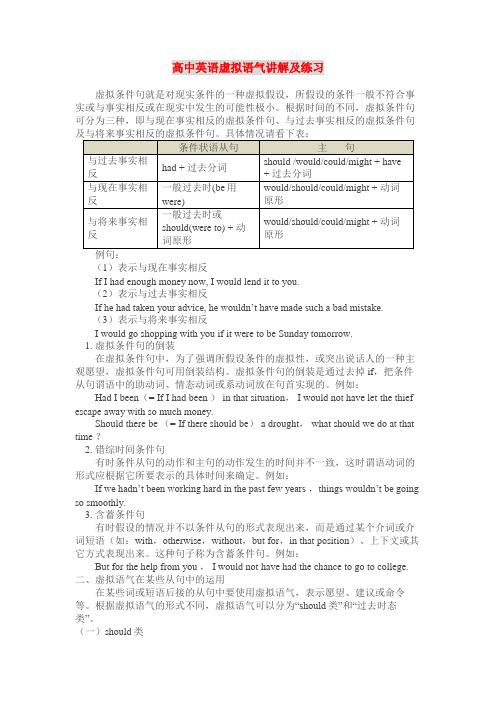
高中英语虚拟语气讲解及练习虚拟条件句就是对现实条件的一种虚拟假设,所假设的条件一般不符合事实或与事实相反或在现实中发生的可能性极小。
根据时间的不同,虚拟条件句可分为三种,即与现在事实相反的虚拟条件句、与过去事实相反的虚拟条件句(1)表示与现在事实相反If I had enough money now, I would lend it to you.(2)表示与过去事实相反If he had taken your advice, he wouldn’t have made such a bad mistake.(3)表示与将来事实相反I would go shopping with you if it were to be Sunday tomorrow.1. 虚拟条件句的倒装在虚拟条件句中,为了强调所假设条件的虚拟性,或突出说话人的一种主观愿望,虚拟条件句可用倒装结构。
虚拟条件句的倒装是通过去掉if,把条件从句谓语中的助动词、情态动词或系动词放在句首实现的。
例如:Had I been(= If I had been ) in that situation, I would not have let the thief escape away with so much money.Should there be (= If there should be) a drought, what should we do at that time ?2. 错综时间条件句有时条件从句的动作和主句的动作发生的时间并不一致,这时谓语动词的形式应根据它所要表示的具体时间来确定。
例如:If we hadn’t been working hard in the past few years ,thing s wouldn’t be going so smoothly.3. 含蓄条件句有时假设的情况并不以条件从句的形式表现出来,而是通过某个介词或介词短语(如:with,otherwise,without,but for,in that position)、上下文或其它方式表现出来。
高中英语虚拟语气讲解及练习附答案

高中英语虚拟语气讲解及练习虚拟条件句就是对现实条件的一种虚拟假设,所假设的条件一般不符合事实或与事实相反或在现实中发生的可能性极小。
根据时间的不同,虚拟条件句可分为三种,即与现在事实相反的虚拟条件句、与过去事实相反的虚拟条件句(1)表示与现在事实相反If I had enough money now, I would lend it to you.(2)表示与过去事实相反If he had taken your advice, he wouldn’t have made such a bad mistake.(3)表示与将来事实相反I would go shopping with you if it were to be Sunday tomorrow.1. 虚拟条件句的倒装在虚拟条件句中,为了强调所假设条件的虚拟性,或突出说话人的一种主观愿望,虚拟条件句可用倒装结构。
虚拟条件句的倒装是通过去掉if,把条件从句谓语中的助动词、情态动词或系动词放在句首实现的。
例如:Had I been(= If I had been ) in that situation, I would not have let the thief escape away with so much money.Should there be (= If there should be) a drought, what should we do at that time ?2. 错综时间条件句有时条件从句的动作和主句的动作发生的时间并不一致,这时谓语动词的形式应根据它所要表示的具体时间来确定。
例如:If we hadn’t been working hard in the past few years ,thing s wouldn’t be going so smoothly.3. 含蓄条件句有时假设的情况并不以条件从句的形式表现出来,而是通过某个介词或介词短语(如:with,otherwise,without,but for,in that position)、上下文或其它方式表现出来。
高中英语虚拟语气讲解及练习附答案
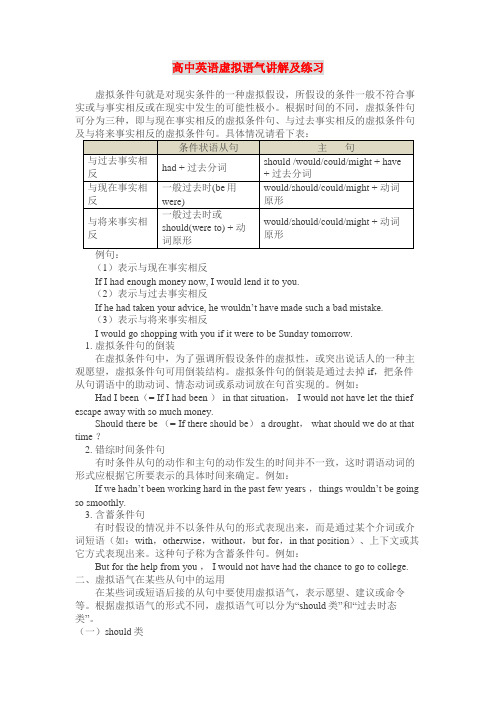
高中英语虚拟语气讲解及练习虚拟条件句就是对现实条件的一种虚拟假设,所假设的条件一般不符合事实或与事实相反或在现实中发生的可能性极小。
根据时间的不同,虚拟条件句可分为三种,即与现在事实相反的虚拟条件句、与过去事实相反的虚拟条件句(1)表示与现在事实相反If I had enough money now, I would lend it to you.(2)表示与过去事实相反If he had taken your advice, he wouldn’t have made such a bad mistake.(3)表示与将来事实相反I would go shopping with you if it were to be Sunday tomorrow.1. 虚拟条件句的倒装在虚拟条件句中,为了强调所假设条件的虚拟性,或突出说话人的一种主观愿望,虚拟条件句可用倒装结构。
虚拟条件句的倒装是通过去掉if,把条件从句谓语中的助动词、情态动词或系动词放在句首实现的。
例如:Had I been(= If I had been ) in that situation, I would not have let the thief escape away with so much money.Should there be (= If there should be) a drought, what should we do at that time ?2. 错综时间条件句有时条件从句的动作和主句的动作发生的时间并不一致,这时谓语动词的形式应根据它所要表示的具体时间来确定。
例如:If we hadn’t been working hard in the past few years ,thing s wouldn’t be going so smoothly.3. 含蓄条件句有时假设的情况并不以条件从句的形式表现出来,而是通过某个介词或介词短语(如:with,otherwise,without,but for,in that position)、上下文或其它方式表现出来。
高中英语语法虚拟语气详解及练习
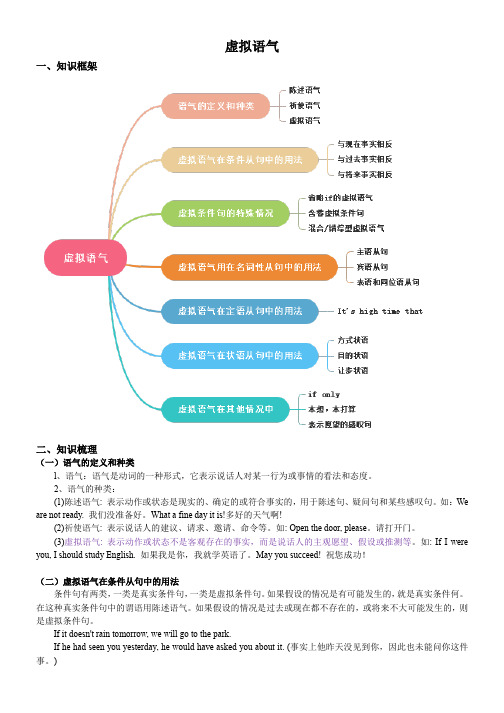
虚拟语气一、知识框架二、知识梳理(一)语气的定义和种类l、语气:语气是动词的一种形式,它表示说话人对某一行为或事情的看法和态度。
2、语气的种类:(1)陈述语气: 表示动作或状态是现实的、确定的或符合事实的,用于陈述句、疑问句和某些感叹句。
如:We are not ready. 我们没准备好。
What a fine day it is!多好的天气啊!(2)祈使语气: 表示说话人的建议、请求、邀请、命令等。
如: Open the door, please。
请打开门。
(3)虚拟语气: 表示动作或状态不是客观存在的事实,而是说话人的主观愿望、假设或推测等。
如: If I were you, I should study English. 如果我是你,我就学英语了。
May you succeed! 祝您成功!(二)虚拟语气在条件从句中的用法条件句有两类,一类是真实条件句,一类是虚拟条件句。
如果假设的情况是有可能发生的,就是真实条件何。
在这种真实条件句中的谓语用陈述语气。
如果假设的情况是过去或现在都不存在的,或将来不大可能发生的,则是虚拟条件句。
If it doesn't rain tomorrow, we will go to the park.If he had seen you yesterday, he would have asked you about it. (事实上他昨天没见到你,因此也未能问你这件在含有虚拟条件句的复合句中,主句和从句的谓语都要用虚拟语气。
同步练习:1. If she had worked harder, she __________.A. would succeedB. had succeededC. should succeedD. would have succeeded2. If my lawyer ________ here last Saturday, he _________me from going.A. had been; would have preventedB. had been; would preventC. were; wouldD. were; would have prevented3. If he were here, he __________ us how to do it.A. toldB. would tellC. had toldD. have told4. If it_________rain next week,the farmers could still have a good harvest.A.shouldB.couldC.wouldD.mightKeys: DABA(三)虚拟条件句的特殊情况(1) 省略if的虚拟语气如果从句中含有were/ should/ had时,则可以把这三个词置于句首,省略if,采用倒装语序。
高中英语虚拟语气讲解及练习附答案
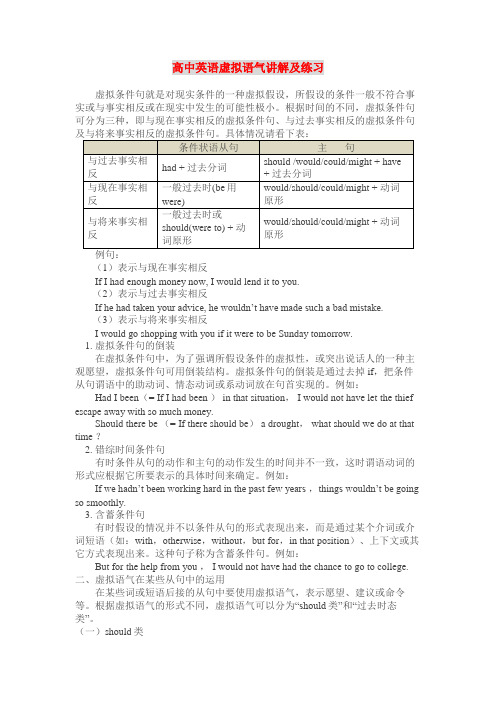
高中英语虚拟语气讲解及练习虚拟条件句就是对现实条件的一种虚拟假设,所假设的条件一般不符合事实或与事实相反或在现实中发生的可能性极小。
根据时间的不同,虚拟条件句可分为三种,即与现在事实相反的虚拟条件句、与过去事实相反的虚拟条件句(1)表示与现在事实相反If I had enough money now, I would lend it to you.(2)表示与过去事实相反If he had taken your advice, he wouldn’t have made such a bad mistake.(3)表示与将来事实相反I would go shopping with you if it were to be Sunday tomorrow.1. 虚拟条件句的倒装在虚拟条件句中,为了强调所假设条件的虚拟性,或突出说话人的一种主观愿望,虚拟条件句可用倒装结构。
虚拟条件句的倒装是通过去掉if,把条件从句谓语中的助动词、情态动词或系动词放在句首实现的。
例如:Had I been(= If I had been ) in that situation, I would not have let the thief escape away with so much money.Should there be (= If there should be) a drought, what should we do at that time ?2. 错综时间条件句有时条件从句的动作和主句的动作发生的时间并不一致,这时谓语动词的形式应根据它所要表示的具体时间来确定。
例如:If we hadn’t been working hard in the past few years ,thing s wouldn’t be going so smoothly.3. 含蓄条件句有时假设的情况并不以条件从句的形式表现出来,而是通过某个介词或介词短语(如:with,otherwise,without,but for,in that position)、上下文或其它方式表现出来。
高中英语虚拟语气讲解及练习附答案

高中英语虚拟语气讲解及练习虚拟条件句就是对现实条件的一种虚拟假设,所假设的条件一般不符合事实或与事实相反或在现实中发生的可能性极小。
根据时间的不同,虚拟条件句可分为三种,即与现在事实相反的虚拟条件句、与过去事实相反的虚拟条件句(1)表示与现在事实相反If I had enough money now, I would lend it to you.(2)表示与过去事实相反If he had taken your advice, he wouldn’t have made such a bad mistake.(3)表示与将来事实相反I would go shopping with you if it were to be Sunday tomorrow.1. 虚拟条件句的倒装在虚拟条件句中,为了强调所假设条件的虚拟性,或突出说话人的一种主观愿望,虚拟条件句可用倒装结构。
虚拟条件句的倒装是通过去掉if,把条件从句谓语中的助动词、情态动词或系动词放在句首实现的。
例如:Had I been(= If I had been ) in that situation, I would not have let the thief escape away with so much money.Should there be (= If there should be) a drought, what should we do at that time ?2. 错综时间条件句有时条件从句的动作和主句的动作发生的时间并不一致,这时谓语动词的形式应根据它所要表示的具体时间来确定。
例如:If we hadn’t been working hard in the past few years ,thing s wouldn’t be going so smoothly.3. 含蓄条件句有时假设的情况并不以条件从句的形式表现出来,而是通过某个介词或介词短语(如:with,otherwise,without,but for,in that position)、上下文或其它方式表现出来。
高中英语虚拟语气讲解及练习附答案

高中英语虚拟语气讲解及练习虚拟条件句就是对现实条件的一种虚拟假设,所假设的条件一般不符合事实或与事实相反或在现实中发生的可能性极小。
根据时间的不同,虚拟条件句可分为三种,即与现在事实相反的虚拟条件句、与过去事实相反的虚拟条件句(1)表示与现在事实相反If I had enough money now, I would lend it to you.(2)表示与过去事实相反If he had taken your advice, he wouldn’t have made such a bad mistake.(3)表示与将来事实相反I would go shopping with you if it were to be Sunday tomorrow.1. 虚拟条件句的倒装在虚拟条件句中,为了强调所假设条件的虚拟性,或突出说话人的一种主观愿望,虚拟条件句可用倒装结构。
虚拟条件句的倒装是通过去掉if,把条件从句谓语中的助动词、情态动词或系动词放在句首实现的。
例如:Had I been(= If I had been ) in that situation, I would not have let the thief escape away with so much money.Should there be (= If there should be) a drought, what should we do at that time ?2. 错综时间条件句有时条件从句的动作和主句的动作发生的时间并不一致,这时谓语动词的形式应根据它所要表示的具体时间来确定。
例如:If we hadn’t been working hard in the past few years ,thing s wouldn’t be going so smoothly.3. 含蓄条件句有时假设的情况并不以条件从句的形式表现出来,而是通过某个介词或介词短语(如:with,otherwise,without,but for,in that position)、上下文或其它方式表现出来。
高中英语虚拟语气讲解及练习附答案解析

高中英语虚拟语气讲解及练习虚拟条件句就是对现实条件的一种虚拟假设,所假设的条件一般不符合事实或与事实相反或在现实中发生的可能性极小。
根据时间的不同,虚拟条件句可分为三种,即与现在事实相反的虚拟条件句、与过去事实相反的虚拟条件句(1)表示与现在事实相反If I had enough money now, I would lend it to you.(2)表示与过去事实相反If he had taken your advice, he wouldn’t have made such a bad mistake.(3)表示与将来事实相反I would go shopping with you if it were to be Sunday tomorrow.1. 虚拟条件句的倒装在虚拟条件句中,为了强调所假设条件的虚拟性,或突出说话人的一种主观愿望,虚拟条件句可用倒装结构。
虚拟条件句的倒装是通过去掉if,把条件从句谓语中的助动词、情态动词或系动词放在句首实现的。
例如:Had I been(= If I had been ) in that situation, I would not have let the thief escape away with so much money.Should there be (= If there should be) a drought, what should we do at that time ?2. 错综时间条件句有时条件从句的动作和主句的动作发生的时间并不一致,这时谓语动词的形式应根据它所要表示的具体时间来确定。
例如:If we hadn’t been working hard in the past few years ,thing s wouldn’t be going so smoothly.3. 含蓄条件句有时假设的情况并不以条件从句的形式表现出来,而是通过某个介词或介词短语(如:with,otherwise,without,but for,in that position)、上下文或其它方式表现出来。
- 1、下载文档前请自行甄别文档内容的完整性,平台不提供额外的编辑、内容补充、找答案等附加服务。
- 2、"仅部分预览"的文档,不可在线预览部分如存在完整性等问题,可反馈申请退款(可完整预览的文档不适用该条件!)。
- 3、如文档侵犯您的权益,请联系客服反馈,我们会尽快为您处理(人工客服工作时间:9:00-18:30)。
虚拟语气英语有两种语气——陈述语气和虚拟语气。
陈述语气表示事实上发生的事情或客观存在的情况。
虚拟语气表示假定、想象、愿望等非事实观念。
Ⅰ.虚拟语气在条件句中主要有以下几种情况。
(1).表达与现在的事实相反的假设或想象:条件从句主句If + 主语+ 过去式,主语+ should/would + 动词原形If + 主语+ were,主语+ would/should + 动词原形(其中,should用于第一人称,would可用于各个人称。
)If I had enough money, I should/would buy a camera.If I were rich, I would help the poor.(2).表达与过去事实相反的假设或想象:条件从句主句If + 主语+ had + 过去分词,主语+ should/would have + 过去分词If I had had enough money, I would have bought a car.(= I didn’t have enough money, so I didn’t buy it.)If it had not rained yesterday, we should have gone fishing.(3)表达与将来事实相反的假设或想象,有三种形式:①条件从句主句If +主语+ should + 动词原形,主语+ should/would + 动词原形(表示可能性极小“万一”)If it should rain tomorrow, I would not go.注意:if从句的动词形式不分人称与数,一律用“should+动词原形”②条件从句主句If +主语+ were to + 动词原形,主语+ should/would +动词原形If I were to go abroad, I would go to America. 倘若我要出国,我就到美国。
③条件从句主句If +主语+动词过去式,主语+ should/would +动词原形If he went to the party, he would be disappointed.(4)在条件状语从句中,常会出现主句所表示的行为所发生的时间与从句表示的行为的时间不一致,叫做错综时间虚拟条件句,即条件从句与主句所指时间不一致。
如从句指过去,而主句却指现在或将来,此时应根据具体的语境,结合上面提到的三种基本类型对时态作出相应的调整。
If you had gone to bed early last night, you would not be so sleepy now.If I were you, I wouldn’t have gone to the party last night.(5) 假设情况不用if从句来表示,而是用without, but for, otherwise, or, but等表示一种含蓄条件。
表示与现在或将来相反,用“would (should, could, might)+动词原形”;表示与过去相反用“w ould (should, could, might)+have+过去分词”I knew my uncle did have no time. Otherwise he would have kept me company to go hiking.例1:We ______ John's name on the race list yesterday but for his recent injury. (2011·江西卷28)A. will putB. will have putC. would putD. would have put例2: I ______ through that bitter period without your generous help. (2011·陕西卷22)A. couldn't have goneB. didn't goC. wouldn't goD. hadn't gone(5)条件从句if的省略:当从句中有were,过去分词had, 或should时,if经常省略。
此时,主语后面的主动词(were,had,should 等)被移至句首。
Were I a bird, I would fly to you.= If I were a bird, I would fly to you,Should it rain tomorrow, I would not go there.= If it should rain tomorrow, I would not go there.例:______ in your position, I would go.A. If IB. Were IC. If was ID. If I amⅡ用在从句中的虚拟语气⒈宾语从句中的应用(1)wish后的宾语从句:表示与现在事实相反的愿望,从句谓语用一般过去时或过去进行时;表示与过去相反的愿望,从句谓语用过去完成时;表示将来没有把握或不太可能实现的主观愿望,常用“would (could)+动词原形”。
I wish I knew the answer to the question..I wished I hadn’t spent so much money.I wish it would stop raining.I wish you would come soon.例:—Where are the children?—I wish they ______ always late. (2011·北京卷28)A. weren'tB. hadn't beenC. wouldn't beD. wouldn't have been(2) 在具有愿望、请求、建议、命令等主观意愿的动词(desire, demand, advice, insist, require, suggest, propose, order, recommend, decide …) 后的宾语从句中需用虚拟语气。
谓语动词用(should) +动词原形。
值得注意的是,如果宾语从句的动词是否定的,否定词not的位置应在动词之前,而不是动词之后。
I demand that he (should) answer me immediately.The head nurse insisted that the patient not be move.【注意】(1)suggest 意为“表明,暗示”时,宾语从句不用虚拟语气.His pale face suggested that he was in poor health.(2)insist 意为“坚持认为,坚持说”时,宾语从句不用虚拟语气。
He insisted that he did not kill the boy.2. 主语从句中的应用It is+形容词/ 名词/ 过去分词+ that引导的主语从句,主语从句中谓语动词常用“should + 动词原形”。
常用形容词有:necessary, important, essential, imperative, urgent, preferable, vital, advisable等常用名词有:duty, pity, regret, no wonder, shame等。
常用过去分词有:demanded, suggested, required, requested, ordered, decided等It is suggested that pupils (should) wear school uniforms.It is important that everyone (should) inform themselves of these rules.It is a pity that he (should) refuse to accept the offer3.表语从句中的应用上述动词相应的名词形式作主语+连系动词构成表语从句,要用虚拟语气,即“should + 动词原形”.常用名词形式有:advice, decision, demand, proposal, request, order, suggestion等。
His suggestion was that the meeting (should) be put off.Ⅲ其他形式的虚拟语气1. 在It's (high/about) time “该干某事了” 之后的定语从句中需用虚拟语气。
谓语动词用过去式.It is high time that you went to school.2. 虚拟语气在as if / as though 引导的方式状语从句中的应用(谓语动词形式与wish后的宾语从句基本相同)表示与现在事实相反,从句谓语用一般过去时或过去进行时;表示与过去事实相反,用过去完成时;表示将来的可能性不大,用“would (could)+动词原形”He felt as if he were responsible for what had happened.He treats me as if I were a stranger.Even if she had been ill, she would have gone to her office.3.if only 引起的感叹句中需用虚拟语气表示与现在或未来事情相反的愿望,谓语动词用过去式或would/should+动词原形表示与过去事实相反的愿望,谓语动词用过去完成式。
Look at the terrible situation I am in! If only I had followed your advice.If only I had not been busy last week.4. would (had)rather , would sooner也用来表达主观愿望,它们之后的宾语从句中需用虚拟语气。
表示与现在或未来事情相反的愿望,谓语动词用过去式.表示与过去事实相反的愿望,谓语动词用过去完成式.I would rather he went right now.补充:“情态动词+have done”的用法must have done表示对过去事情的肯定推测。
can't / couldn't have done表示对过去所发生的事情所做的否定推测。
